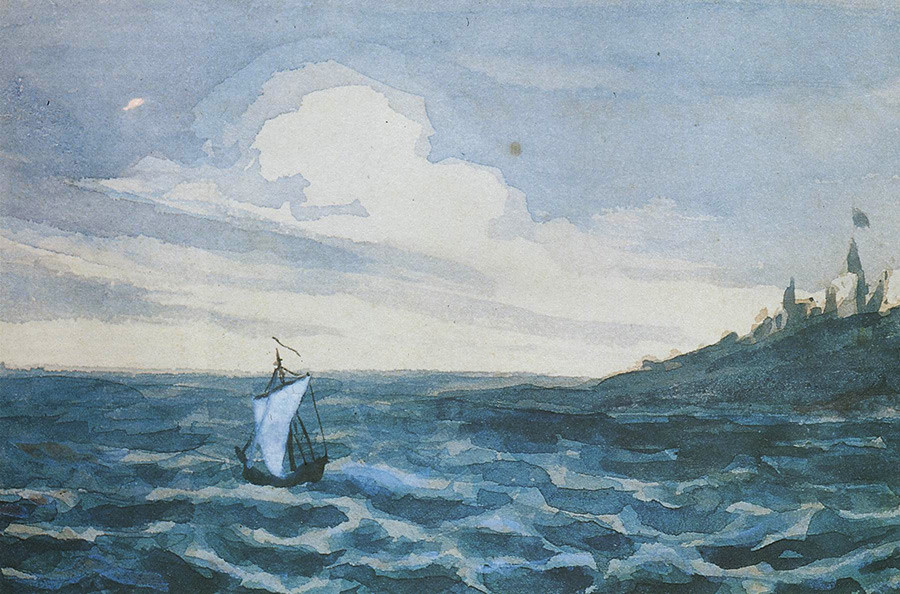Vladimir Nabokov
To Russia
Let me go; set me free of my shackles!
In the dark, when commotion subsides,
I'm dying; I'm drained by the battles
Within dreams of you, flowing like tides.
Let the ones who at will have abandoned
Their motherland wail and complain,
They're on top; I've already descended —
Don't you dare approach me again.
I'll abandon the books I revere;
I'm ready to live in a cave;
So that you from my dreams disappear,
Every dream I'm ready to waive.
And degrade my own self to damnation,
Drop my name and be stripped to the bone,
For the dialect of any nation
Trade my tongue — the last asset I own.
For this sacrifice, Russia, through tears
through the grass on my parents' tombs,
through the memories of my young years,
through the catkins of birch trees in bloom,
Don't you look at me; I beg for mercy;
In this pit all is burnt to the core,
It is void; your blind search is unworthy.
Don't you try my past life to restore!
It's too late; years, ages have vanished,
For the shame and the grief in my soul,
For its torment — no one will be punished,
And no one will be ever absolved.
Vladimir Nabokov
To Russia
Let me go; set me free of my shackles!
In the dark, when commotion subsides,
I'm dying; I'm drained by the battles
Within dreams of you, flowing like tides.
Let the ones who at will have abandoned
Their motherland wail and complain,
They're on top; I've already descended —
Don't you dare approach me again.
I'll abandon the books I revere;
I'm ready to live in a cave;
So that you from my dreams disappear,
Every dream I'm ready to waive.
And degrade my own self to damnation,
Drop my name and be stripped to the bone,
For the dialect of any nation
Trade my tongue — the last asset I own.
For this sacrifice, Russia, through tears
through the grass on my parents' tombs,
through the memories of my young years,
through the catkins of birch trees in bloom,
Don't you look at me; I beg for mercy;
In this pit all is burnt to the core,
It is void; your blind search is unworthy.
Don't you try my past life to restore!
It's too late; years, ages have vanished,
For the shame and the grief in my soul,
For its torment — no one will be punished,
And no one will be ever absolved.
Vladimir Nabokov
To Russia
Let me go; set me free of my shackles!
In the dark, when commotion subsides,
I'm dying; I'm drained by the battles
Within dreams of you, flowing like tides.
Let the ones who at will have abandoned
Their motherland wail and complain,
They're on top; I've already descended —
Don't you dare approach me again.
I'll abandon the books I revere;
I'm ready to live in a cave;
So that you from my dreams disappear,
Every dream I'm ready to waive.
And degrade my own self to damnation,
Drop my name and be stripped to the bone,
For the dialect of any nation
Trade my tongue — the last asset I own.
For this sacrifice, Russia, through tears
through the grass on my parents' tombs,
through the memories of my young years,
through the catkins of birch trees in bloom,
Don't you look at me; I beg for mercy;
In this pit all is burnt to the core,
It is void; your blind search is unworthy.
Don't you try my past life to restore!
It's too late; years, ages have vanished,
For the shame and the grief in my soul,
For its torment — no one will be punished,
And no one will be ever absolved.
Vladimir Nabokov
To Russia
Let me go; set me free of my shackles!
In the dark, when commotion subsides,
I'm dying; I'm drained by the battles
Within dreams of you, flowing like tides.
Let the ones who at will have abandoned
Their motherland wail and complain,
They're on top; I've already descended —
Don't you dare approach me again.
I'll abandon the books I revere;
I'm ready to live in a cave;
So that you from my dreams disappear,
Every dream I'm ready to waive.
And degrade my own self to damnation,
Drop my name and be stripped to the bone,
For the dialect of any nation
Trade my tongue — the last asset I own.
For this sacrifice, Russia, through tears
through the grass on my parents' tombs,
through the memories of my young years,
through the catkins of birch trees in bloom,
Don't you look at me; I beg for mercy;
In this pit all is burnt to the core,
It is void; your blind search is unworthy.
Don't you try my past life to restore!
It's too late; years, ages have vanished,
For the shame and the grief in my soul,
For its torment — no one will be punished,
And no one will be ever absolved.


